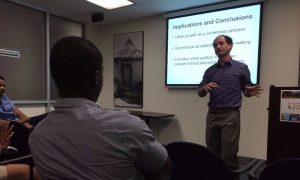 Jeffrey W. Paller from the University of San Francisco presented “Everyday Urban Politics: Leadership and Civic Life in Ghana,” at our most recent Baraza on Friday October 13. Dr. Paller received his PhD from University of Wisconsin, completed a post-doc at Columbia, and was a lecturer at Bates College. His research focuses on urbanization and urban politics in sub-Saharan Africa. The work presented in his lecture was an overview of a chapter from his forthcoming book.
Jeffrey W. Paller from the University of San Francisco presented “Everyday Urban Politics: Leadership and Civic Life in Ghana,” at our most recent Baraza on Friday October 13. Dr. Paller received his PhD from University of Wisconsin, completed a post-doc at Columbia, and was a lecturer at Bates College. His research focuses on urbanization and urban politics in sub-Saharan Africa. The work presented in his lecture was an overview of a chapter from his forthcoming book.
His presentation focused on three urban settlements in Ghana. He studied these sites to better understand the construction of legitimate authority within squatter communities. His ethnographic research focused on community meetings, political rallies, forced eviction events, and the offices of private politicians or chiefs. Dr. Paller also conducted focus groups and household surveys to collect information about community perceptions of leadership and authority. In total he surveyed 1183 respondents in 150 neighborhoods, 15 communities, and 3 cities. As part of his lecture, Dr. Paller discussed the impact of UF Africanists and political scientists on the theoretical foundations of his work, citing scholars including René Lemarchand, Göran Hydén, Leo Villalón, Sebastian Elischer, Brenda Chalfin, Keith Weghorst, Michael H. Bernhard, and Staffan I. Lindberg.
Focusing on the construction of legitimate authority, Dr. Paller considered the role of opinion leaders in urban settlements, or slums. Opinion leaders were described as local leaders with the respect of constituents. These leaders achieved status and reputation through their wisdom and ability to give good advice. He identified characteristics community members expected of legitimate and illegitimate leaders and used these identifiers to describe community perceptions of leaders in Old Fadama and Ashaiman. He also considered factors such as ethnic affiliations and social ties, location of political connections, and influence of shame or honor. Dr. Paller concluded that urban growth is a contentious process, which includes governance as collective decision-making and politics that involve interactions between formal and informal institutions.